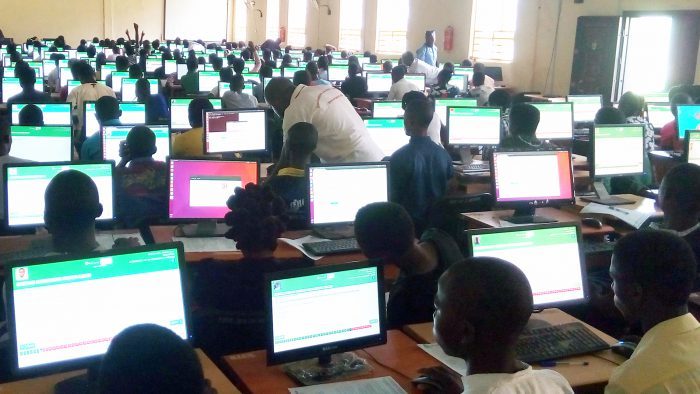The Federal Executive Council during its meeting on Wednesday presided over by President Muhammadu Buhari ordered the forensic probe of some government agencies.
The exercise is to recover unremitted revenues, according to Minister of Finance Mrs Kemi Adeosun, who briefed State House correspondents at the end of the Federal Executive Council (FEC) meeting.
With Mrs Adeosun were Minister of Water Resources Suleiman Adamu, Minister of Budget and National Planning, Udoma Udo Udoma and Special Adviser to the President on Media and Publicity, Femi Adesina.
According to her, some of the government agencies suspected to be diverting government revenues will be made to account for the past revenues.
She said the Joint Admissions and Matriculation Board (JAMB), which had been remitting N3 million annually, remitted N5 billion this year alone and disclosed that it had N3 billion more to remit to the government’s purse this year.
The minister also listed past management of the Nigerian Maritime Administration and Safety Agency (NIMASA) among the offenders.
She said: “Secondly, we spoke about revenue generation. The VAIDS Programme is ongoing and we are having quite a positive response in terms of tax compliance.
“We also reported on the progress made by a number of our agencies some of whom have reported very significant increases in the amount paid into the consolidated revenue fund.
“Council discussed JAMB, which recorded significant progress and NIMASA as well as others and gave us the charge to really go and look at these agencies, look in some cases the past management of those agencies and see where those agencies were leaking and to encourage agencies that haven’t done so to continue with efficiencies,” she said.
Asked to disclose the figures expected from the agencies, Mrs Adeosun said: “The highest amount that JAMB has ever remitted to the consolidated revenue fund before this management was N3 million. This year, so far, they have done N5 billion and the Minister of Education reported that they have additional N3 billion that they are ready to remit, which will take this year’s figure alone to N8 billion.
“Now they have not increased their charges nor their fees. So the question that Council members were asking was that where were all these monies before?
“So the directive was given that we must call those who were the heads of those agencies and similar ones to account and that is what we intend to do.”
She added: “It’s a similar story with other agencies and these are the leakages which we are now blocking. These are the monies in the consolidated fund that is now being applied in the projects that really need to get the economy moving. These are the monies that are missing that has led us to the position we are in. It is the grandest looting that this administration action has come in to address.”
The minister also disclosed that FEC approved for Nigeria to rejoin the African Trade Insurance Agency.
She said: “This is an agency that is out to provide risk guarantee for private investors coming into Nigeria as well as exporters from Nigeria.
“It will provide risk guarantees, so instead of projects asking for sovereign guarantees, we will be able to provide that risk mitigation through the African Trade Insurance Agency. Many other countries are already members, so Nigeria will also be joining.
“This agency has an A rating international and is able to guarantee long term projects. So, what we see as a result of this is that there will be increased level of investments particularly PPP where every often the investors want some guarantee from the government. Instead of the government issuing sovereign guarantee directly, this agency will step in and issue it. It is very similar to MIGA, the Multi-lateral Insurance Guarantee Agency that is owned by the IFC.”
She went on “My second activity was part of the briefing on the economy and to speak to the fiscal conditions and outlook.
“As you know, we are on the part way of resetting the economy and adjusting permanently to a sort of lower oil pricing.
“The recent announcement of the exit from recession we see as statically backed indicator that we are moving in the right direction.
“We recognised that there is a lot to be done. I briefed the council on various fiscal initiatives that we are pursuing. These include continued fiscal consolidation and cost efficiency, driving cost savings in government; there is still a great need to do so.
“I have some progress report on the work we have done with payroll where we are still seeing contraction. Every time we put agencies into our automated payroll system we see contraction and we intend to continue with that.
“So, in summary, the outlook is positive. We did some comparative analysis in June 2014 with oil price of $109, federation allocation was N844 billion and in June 2017 it was down to N318 billion, just to give you an idea of how much income the country has really lost in the last few years.
“So, we are adjusting very strongly and we believe if we continue with this trajectory not only will we stay permanently out of recession but, more importantly, we will have a positive and growing economy what works for all Nigerians which is our aim.” she said
Udoma Udo Udoma said his ministry briefed the Council on the recent 2017 Second Quarterly Report of the National Bureau of Statistics (NBS).
He said: “We were encouraged by the GDP growth rates. The report is very encouraging for the government as it shows that we are on the right direction.”
The Minister of Water Resources disclosed that he briefed FEC on floods and possible threats of flood.
He said there was no threat of flood in the country.
The Ministry has observatory units in Niamey and Lokoja, he said, adding: “If there is any indication of significant rise or threat to lives and properties, we will promptly issue warning alerts.
“For now, there is no cause for alarm. We cannot stop the flood but we can provide early warnings.”

